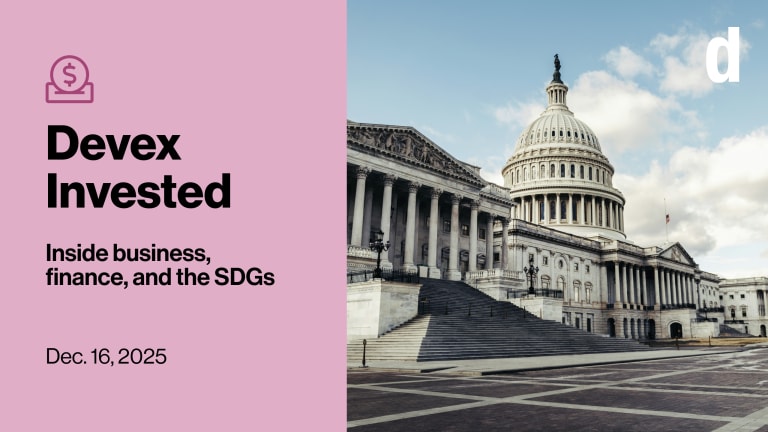ADB opens PPP advisory office to cultivate synergies
The Asian Development Bank this week opened a new office to provide independent advisory services for public-private partnerships in the region. How will it work, and what challenges does it plan to address? We find out.
The Asian Development Bank this week opened a new office to provide independent advisory services for public-private partnerships in a bid to increase, improve and cultivate this development model — which ADB President Takehiko Nakao fully supports to fill investment gaps, create jobs and reduce poverty in Asia-Pacific. Although PPPs are by no means a new thing in the international development sector, the potential of engaging the private sector has yet to be fulfilled, and the Manila-based institution wants to change that as part of the bank’s Strategy 2020 development blueprint for the region. “[The] PPP model is important and its potential is huge for further development,” Ryuichi Kaga, head of the newly established PPP office in ADB, told Devex. “The objective of this office is to achieve the PPP operational plan designed under the Strategy 2020.” While economic growth remains stellar in many Asia-Pacific countries, inequality and pockets of extreme poverty are still a very serious problem in some nations. One of the reasons, experts suggest, is lack of infrastructure development, but the bank is thinking more along the lines of a general lack of resources. Regional infrastructure investment needs in the next decade alone amount to about $8 trillion, or $800 billion annually. Kaga suggested that half of that amount will be focused on energy development programs and around $2.5 trillion will be earmarked for transport projects. The figures, bank data shows, remain extremely difficult to achieve even with the combined financial resources of all development banks in the world. In its PPP operational plan launched in 2012, ADB underscored that in order to meet Asia-Pacific’s infrastructure investment needs, countries can either review their current source of funding and explore additional funding within that framework, or consider a greater role for PPPs. “The private sector is often considered to provide greater efficiency than the public sector when managing infrastructure projects and delivering infrastructure services,” the document notes. “Involvement of the private sector has the potential to increase operating efficiency by making investments in new technologies, bringing innovative solutions and encouraging more transparent organizational structures.” Functions The basic function of the new office will be to provide technical and transaction advisory services for ADB member countries who want to engage in PPP transactions, but lack the proper expertise and structure for implementation. PPP operations in the bank are currently anchored in four pillars, namely: 1. Advocacy and capacity development to empower and educate member governments on PPP operations. 2. Developing an enabling environment, including the setup of regulatory and legal framework for PPPs to thrive. 3. Project development. 4. Project financing. Prior to the establishment of the new PPP advisory office, Kaga explained that the first three pillars were carried out by the regional offices mainly focused on developing frameworks with the project financing handled by ADB’s private sector operations department. Project development will now be assigned to the new office, focusing on individual PPP transactions conducted by the bank. “This new office is in charge of providing transaction and advisory services. These services will be centralized in this office, transferred from the regional offices. Other functions remain with them but supported by us,” the official said. “We will assist governments with feasibility studies, the bidding process for concessions [as well as] fundraising for the projects.” Kaga added: “This combination [of our office and the regional ones] is very important because sometimes, when we seek the framework, they seem too theoretical and academic. If we provide the technical and advisory services, we can get feedback from individual transactions and we can reflect it into the framework.” The office will thus be solely focused on independent advisory to the public sector and not financing, although the bank — particularly regional offices and the ADB’s private sector operations department — can recommend financing on a case-to-case basis. Kaga explained that the advisory services will be subject to various fees, including a retainer fee to cover expenses or the recovery cost and a success charge — estimated at 0.5 to 3 percent of project cost — charged to the member country government once the bidding process is complete and the concession agreement is signed by the winning bidder. The ADB official clarified that while the success fee is charged to the member government, it is often the case that winning bidders pay a certain fee to the host government that basically translates to the success fee, “so the real payment will be with the concessionaire.” As for why the office will cater only to the public sector, the new office is not meant to distort the PPP advisory market, but strengthen it and improve collaboration with existing players. Right now, Kaga’s team is reviewing potential PPPs around the region, with an initial marketing strategy, after which the bank will look to talk with candidates and the member governments. Operations are expected to hit full throttle in January next year. Challenges While the PPP model looks to be an attractive approach in pursuing development for the region, coupled with the high amount of interest from several stakeholders, challenges remain. One of the biggest obstacles is the different capacity and regulatory levels of member governments, which may affect the effectiveness and efficiency — and even the investment attractiveness — of a PPP project once it is rolled out. “In many countries, even without frameworks, they are proceeding with their PPP projects,” Kaga said. “It's not ideal because if they have a framework, it is much easier to function, for example, in standardizing documents and operations.” He explained that several factors can affect this, including the presence of local practices that, while ideal to embed, should be balanced with international best practices and standards. “If they want to invite foreign investors and concessionaires, they absolutely need international best practices so we need to educate the government that these international best practices are important,” Kaga said. Join Devex, the largest online community for international development, to network with peers, discover talent and forge new partnerships — it’s free. Then sign up for the Devex Impact newsletter to receive cutting-edge news and analysis every month on the intersection of business and development.
The Asian Development Bank this week opened a new office to provide independent advisory services for public-private partnerships in a bid to increase, improve and cultivate this development model — which ADB President Takehiko Nakao fully supports to fill investment gaps, create jobs and reduce poverty in Asia-Pacific.
Although PPPs are by no means a new thing in the international development sector, the potential of engaging the private sector has yet to be fulfilled, and the Manila-based institution wants to change that as part of the bank’s Strategy 2020 development blueprint for the region.
“[The] PPP model is important and its potential is huge for further development,” Ryuichi Kaga, head of the newly established PPP office in ADB, told Devex. “The objective of this office is to achieve the PPP operational plan designed under the Strategy 2020.”
This article is free to read - just register or sign in
Access news, newsletters, events and more.
Join usSign inPrinting articles to share with others is a breach of our terms and conditions and copyright policy. Please use the sharing options on the left side of the article. Devex Pro members may share up to 10 articles per month using the Pro share tool ( ).
Lean Alfred Santos is a former Devex development reporter focusing on the development community in Asia-Pacific, including major players such as the Asian Development Bank and the Asian Infrastructure Investment Bank. He previously covered Philippine and international business and economic news, sports and politics.








